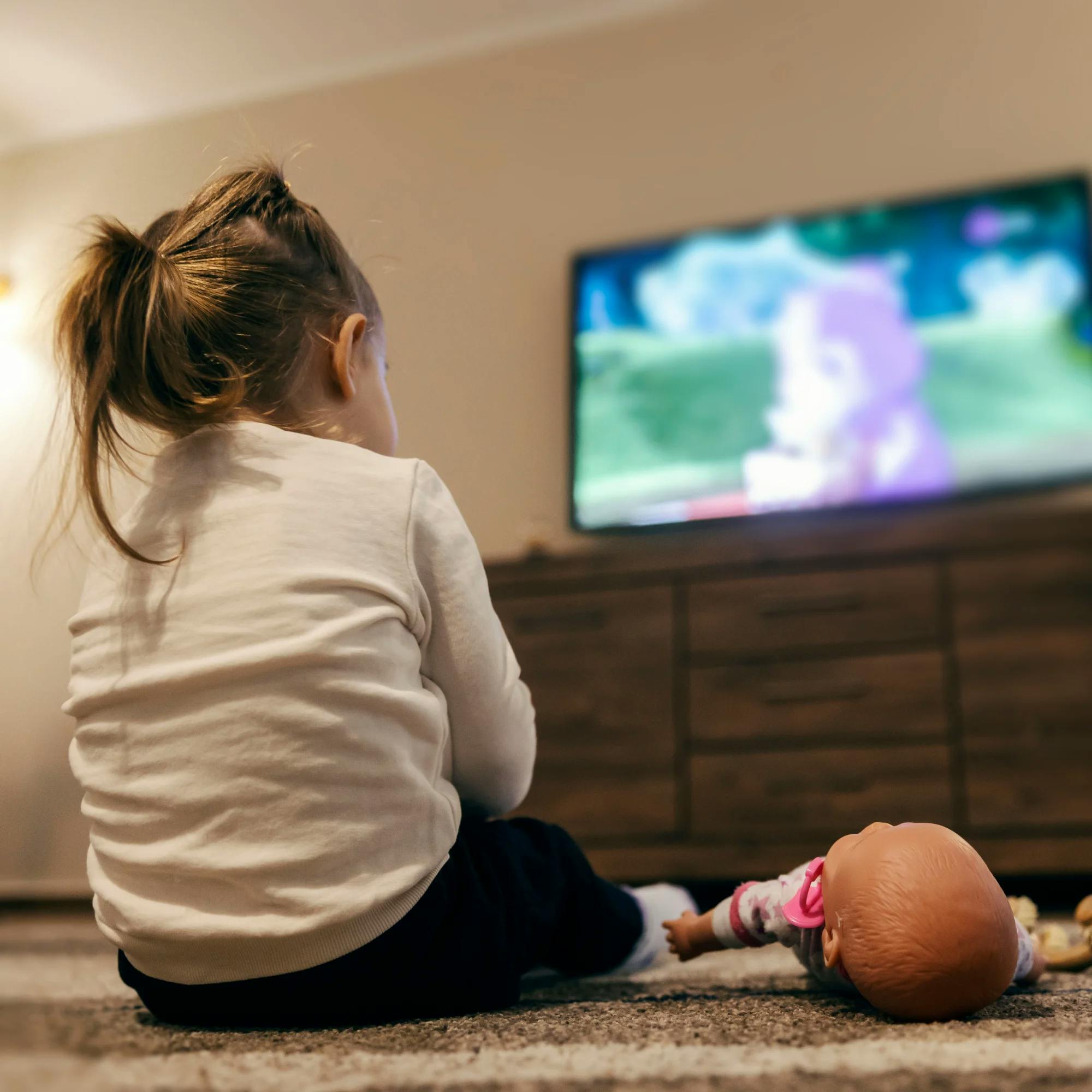If you have a baby or toddler, you’ve probably thought about screen time. There’s been a lot of research done on this topic, and a recent study revealed significant findings about how screen time affects young children’s speech and language development.
Let’s take a look at the study’s results and what they mean for you as a parent. We'll also share practical tips for limiting your child’s screen use and forming healthy screen time habits.
Free speech check
How well is your child speaking for their age? Find out with our free 5-minute online screener. No signup required, just answers.
 Start the screener
Start the screenerWhat did the study measure?
This study, published in the journal JAMA Pediatrics, looked at the development of 7,097 babies born in Japan. Pregnant women were recruited for this study between 2013 and 2017, and researchers collected data about their children’s development and screen time use. The researchers wanted to see if there is a correlation between screen time use and childhood developmental delays.
Screen time for this study included watching TV; using cell phones, tablets, or other devices; and playing video games.
The mothers were asked how much daily screen time their baby had at 1 year of age. Once the kids were 2 and 4 years old, the parents completed a questionnaire to assess their child’s development. This questionnaire looked at communication skills, such as the child’s ability to use phrases or identify pictures based on vocabulary words.
What did the study find?
Greater amounts of screen time were linked with a higher likelihood of developmental delays in communication. Take a look at the numbers:
With up to 2 hours of daily screen time use at age 1, children were 61% more likely to have communication delays at age 2
With 2 to 4 hours of daily screen time at age 1, 2-year-olds were twice as likely to have a communication delay
With more than 4 hours of daily screen time, 2-year-olds were five times more likely to have a communication delay


Other studies on screen time have had similar results
The negative effects of passive screen time on language development have been well documented by researchers.
One study surveyed the effects of media exposure on over 1,000 toddlers younger than 2 years old. They found a strong link with language development: The more videos that toddlers watched, the fewer words they knew or said. In fact, for each additional hour of videos that young children watched, they said on average six to eight fewer words--which adds up over time!
Another study showed the harmful effects of passive screen time. Researchers found that before a child's first birthday, those who watched more than 2 hours of TV a day were six times more likely to develop a language delay.
This study showed that the more time children spent using handheld screens, such as tablets, phones, and electronic games, the more likely they were to develop a speech delay. Each additional 30 minutes they spent on these devices translated into a 49% increase in the likelihood of delayed speech development.
Find the right speech therapist for your child
We'll match you with a licensed speech therapist who's experienced in your child's needs and available when you are.
 Get started
Get startedWhat’s the connection between screen time and speech and language development?
Think about it this way: Every hour spent using a screen is less time interacting face-to-face, reading, playing, or socializing with others.
The first several years of a child’s life are critical. It’s when their brains are rapidly developing and learning language. The communication skills kids develop now will stick with them for a lifetime. And those foundational skills come to children through listening, imitating, and interacting with people around them.
The more time kids spend sitting in front of a screen, the less time they spend interacting with the world around them.
Unfortunately, the more time your child spends sitting passively in front of a screen, the less time they spend interacting with the world around them. Think about taking a walk around the neighborhood. If your child is in their stroller watching their favorite show on a tablet, they're missing an opportunity to interact with you, ask questions, point to objects, learn new vocabulary words, and more.
How to manage your child’s screen time
While managing screen time may seem like another responsibility to put on the parenting checklist, it's so important for your child’s development.
Of course, you can't remove screens entirely from your child's life. At the end of the day, moderation is what’s most important.
Screen time recommendations for kids of different ages
The American Academy of Pediatrics (AAP) provides some helpful recommendations on when and how to use screens with your child.
18 months and younger: Try to avoid screen time altogether, unless you and your child are video chatting with family or attending online speech therapy.
18-24 months: At this age, you can introduce your toddler to some digital media. However, it’s not only important to limit their use, but also to choose high-quality educational programming. Watch these programs with your child so you can explain what’s on screen and ask stimulating questions throughout.
2-5 years of age: During this key developmental stage, AAP recommends limiting non-educational screen time to about 1 hour a weekday and 3 hours on the weekends. Again, try to watch TV or play online games alongside your child. This way you can help your child connect what’s on screen to the real world.
Ages 6 and older: Continue to limit your child’s screen time. Monitor what and how much they watch to ensure it’s not interfering with their schoolwork, sleep, or other healthy activities.


What about educational shows and apps?
When you have a young child, using screens can be convenient–and tempting! That’s especially true when the apps or shows appear to be educational.
There are some positives to using technology. But it’s important to know that learning words on a screen, and in relation to what’s on a screen, is different from learning words from people during everyday routines.
The American Academy of Pediatrics explains that 15-month-olds can learn words from screens, such as how to label various items. However, they may not be able to easily apply those words to the same items in the real world. So if a child learns the word cup when shown a picture of a cup on a tablet app, they may not be able to label their own cup at home, or say the word “cup” to ask for it.


Help your child form healthy screen habits
No matter how old your child is, there are many things you can do to encourage positive screen habits. It’s never too early (or late) to begin using these with your family!
Turn off screens during mealtime, family outings, and 30 to 60 minutes before bedtime.
Make sure you know the programs your child is watching or games they’re playing. Ensure these are age-appropriate. Think about putting parental controls on your devices.
Try not to use screens to pacify bad behavior. While this can often be the quickest fix to avoid a temper tantrum, it can rapidly turn into a habit. If your child begins to “expect” screen time every time they cry, this habit will be hard to break!
Make screen time “active” screen time. Try to watch media with your child, instead of sticking them in front of a TV or tablet and walking away. Talk about what they’re seeing on screen, ask questions, and make meaningful connections between the characters or events on screen and your child’s real life.
Set good examples with your own screen time. If you tend to scroll endlessly on social media (one of the most common examples of passive screen time), put your phone away when interacting with your child!


What if your child is already addicted to screens?
It happens! Once habits form, they’re hard to break overnight. But that doesn’t mean you can’t make changes. Here are a few tips and tricks that can help break the screen time habit.
First and foremost, you’ll want to set some ground rules. You can try setting a maximum number of minutes or hours your child can spend in front of a screen each day. Or, choose a time of day that screen time is allowed (such as an hour before dinner), then screens get turned off.
If your child is old enough to understand, make sure to clearly explain why you’re limiting screen time. You can also use screen time as a reward if your child does their chores, completes their homework, or spends time playing outside.
What’s most important is to replace media time with activities your child loves. This may take a bit of trial and error, but some ideas include:
Playing outside or at the park
Reading their favorite books
Singing songs or nursery rhymes
Working on a craft project, like sock puppets or modeling clay
Playing with toys or board games
Going on play dates with friends
How to know if your child is on track with their speech and language
If you're not sure if your child is on track with their communication skills, it helps to know the expected milestones for their age. Below are the developmental milestones to look for in babies, toddlers, and young children. If your child doesn’t seem to be meeting some of these milestones, it's a good idea to talk with a speech therapist.
Another way to find out whether your child is on track is with our free self-screener. With this easy online quiz, you’ll answer questions about speech and language tailored to your child’s age. Your results will let you know whether you should speak with a speech therapist. You can then get matched with a speech therapist at Expressable.
If your child has had a lot of screen time, try not to dwell on it. Focus on the changes you can make today, and contact your pediatrician or a speech therapist if you’re concerned about your child’s communication. The sooner your child gets the support they need, the sooner they’ll start making progress!
How Expressable Can Help
Concerned your child isn't reaching age-expected milestones? Looking for communication support from a professional? Expressable is a national online speech therapy practice serving children and adults. We treat all major areas of communication and feeding, offer flexible hours including evenings and weekends, and accept most major health insurance plans. We’re proud to have earned more than 3,000 5-star reviews from our clients (4.9/5 average).
Our therapy model is centered on parent and caregiver involvement. Research proves that empowering caregivers to participate in their loved one’s therapy leads to better outcomes. That’s why we combine live, 1-on-1 speech therapy with personalized education and home practice activities for faster progress.
Communication is more than words. It’s how we share how we feel and show who we are. We’re here to help you or your child do just that.

 Abby Barnes, M.S., CCC-SLP
Abby Barnes, M.S., CCC-SLP












